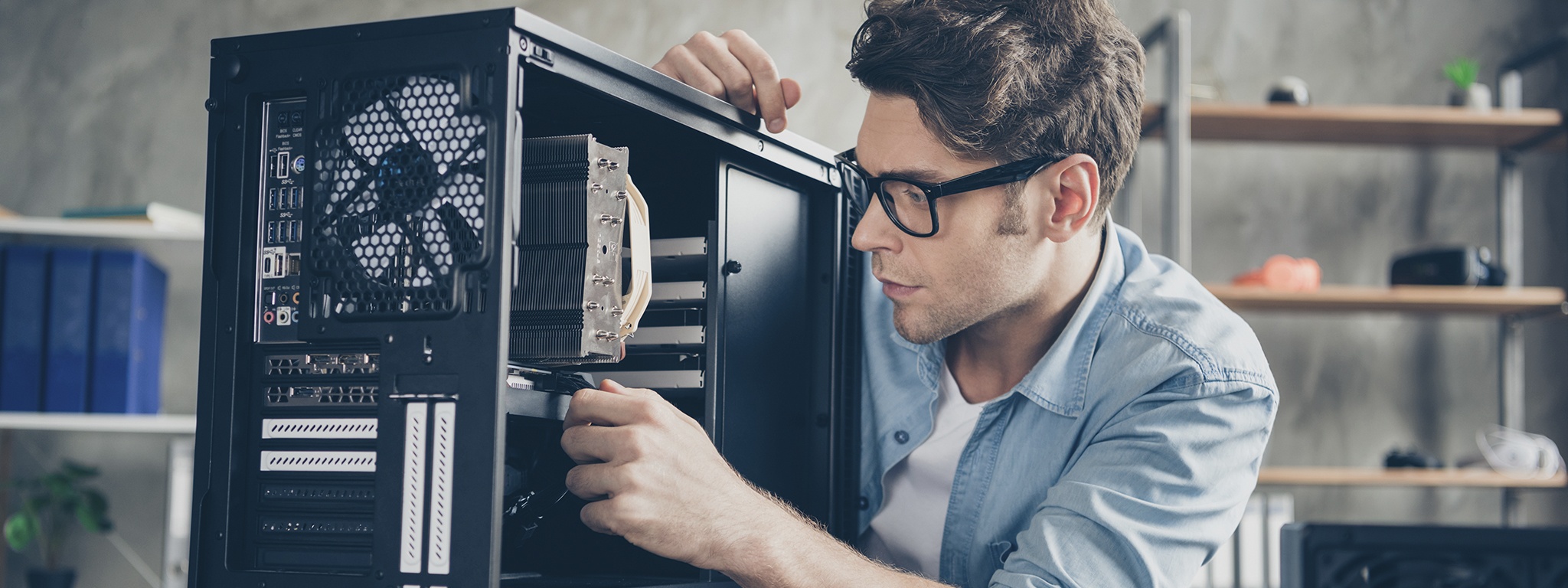
PC Upgrade Guide
Make a slow system run better — SSDs, RAM, CPU, GPU, power, cooling and compatibility tips.
Common problem: Older PCs usually have
mechanical hard drives (HDDs). They are mechanical, wear
out, and are the most likely part to fail.
The fastest, most noticeable upgrade for many systems is
replacing an HDD with a Solid State Drive (SSD). SSDs have
no moving parts, offer much faster boot and load times, and
are more durable.
What is a PC upgrade?
A PC upgrade is replacing or adding hardware to improve performance or capability — examples include a faster CPU, more RAM, a larger or faster drive (SSD), or a better GPU. Upgrades extend the life of an existing system without buying a new one.
PC upgrade guide — quick overview
This guide covers common upgrades, compatibility checks, and practical tips so you can choose the right improvements for your needs.
SSD (Storage)
Best single upgrade for perceived speed. Faster
boot, app launch, and file access.
RAM
Improves multitasking and performance in
memory-heavy apps.
CPU
Boosts raw compute power for rendering, encoding
and heavy workloads.
GPU
Required for modern gaming, 3D work, and
GPU-accelerated tasks.
PSU & Cooling
Ensure stable power and temperatures, especially
with higher-end parts or overclocking.
Frequently asked questions
Why should I consider upgrading my PC?
Upgrading breathes new life into older machines:
better performance, modern software compatibility,
improved gaming, more storage, and cost savings over
buying new hardware.
What are some common PC upgrades?
Common upgrades: SSD for storage, more RAM, faster
CPU, better GPU, improved cooling, and a
higher-capacity or more efficient power supply.
Can I upgrade my PC myself, or do I need professional help?
Many upgrades (RAM, SSD, GPU) are user-installable
with basic tools and guides. For complex upgrades or
if unsure about compatibility, consult a technician.
How do I know if a particular upgrade is compatible with my PC?
Check your motherboard specs (CPU socket, supported
RAM type/speed, M.2/SATA slots, PCIe slots), and
your power supply capacity. Manufacturer docs and
system tools (like CPU-Z) help identify supported
components.
What are the benefits of upgrading the processor?
A faster CPU improves multitasking and performance
in CPU-bound tasks such as video encoding,
rendering, and some games.
How does adding more RAM improve my PC's performance?
More RAM lets the system keep more applications and
data in fast memory, reducing swapping and improving
multitasking smoothness.
What are the advantages of installing a new graphics card?
A new GPU increases frame rates, visual fidelity,
and enables new graphical features — essential for
gaming and GPU-accelerated workloads.
How does replacing the hard drive with an SSD benefit my PC?
SSDs provide much faster data access, quicker boot
and load times, lower power use, less noise, and
better resistance to shock compared with HDDs.
What should I consider when upgrading the power supply?
Choose a PSU with sufficient wattage, correct
connectors, and a good efficiency rating (80 PLUS).
A reliable PSU protects components and ensures
stability under load.
What are the benefits of adding more storage to my PC?
More storage prevents running out of space for files
and programs, and lets you store more media, games,
and project data locally.
Can upgrading my PC improve gaming performance?
Yes. GPU, CPU, and RAM upgrades directly impact
gaming — higher FPS, better settings, and less
stutter.
What is overclocking, and should I consider it?
Overclocking increases component clock speeds for
extra performance but raises power draw and heat. It
can void warranties and requires proper cooling and
caution.
Should I upgrade my operating system when upgrading hardware?
Not always. But some modern hardware requires newer
drivers or OS versions to enable full functionality.
Check compatibility before upgrading the OS.
Are there any software optimizations I can perform before upgrading?
Yes. Try disk cleanup, remove or disable unnecessary
startup apps, update drivers and OS, and scan for
malware — you may get a noticeable speed boost
without hardware changes.
What are the benefits of upgrading to a dual-monitor setup?
Dual monitors increase productivity and multitasking
by providing more screen real estate for apps and
windows.
Is it worth upgrading my PC's cooling system?
Improved cooling helps when components run hot, and
is recommended if you plan to overclock or install
higher-power parts.
What should I consider when upgrading my PC's memory?
Check the maximum supported RAM and the type/speed
your motherboard supports. For best results, match
module specs and prefer kits sold together.
Can I upgrade the sound quality of my PC?
Yes. Use a dedicated sound card or an external DAC
and high-quality speakers/headphones for better
audio fidelity.
Cloning your HDD to an SSD — quick checklist
- Pick an SSD with enough capacity (or larger) than your current drive.
- Get a SATA/USB adapter or install the SSD inside the case.
- Use cloning software (Macrium Reflect Free, Clonezilla, vendor tools) to clone the drive image to the SSD.
- Set the SSD as the primary boot device in BIOS/UEFI and verify it boots.
- After successful boot, optionally wipe the old HDD for reuse or backup.